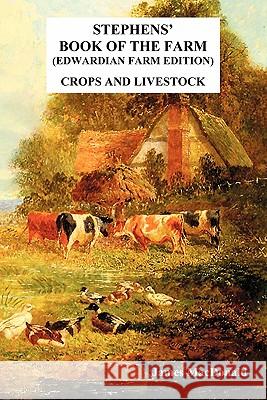Stephens' Book of the Farm Edwardian Farm Edition: Crops and Livestock » książka
Stephens' Book of the Farm Edwardian Farm Edition: Crops and Livestock
ISBN-13: 9781849025416 / Angielski / Miękka / 2011 / 1176 str.
A monumental 1176 page treatise on every aspect of Farm Crops and Farm Livestock in the Edwardian period, this most complete work of its kind, is a mine of information. The livestock section discusses numerous breeds of horses (including ponies and donkeys) cattle, sheep, goats and poultry; the history, characteristics, care, breeding, and showing of each individual breed, as well as a more general discussion of animal husbandry, live stock ailments and remedies, farm pests, and of course animal products-meat, dairy, wool, honey, etc.. Sheepdogs are not overlooked. The farm crop section covers all British grains, beans and peas, potatoes, hops, flax, turnips, forage crops (for cattle) in similar detail, as well as "subsidiary crops" (that is, vegetables I modern usage). As well as the material specifically on crops and livestock, there is considerable background information, including a summary of the seasons and seasonal tasks, a detailed analysis of the then recent experiments in manuring and composting at Rothamstead that continue to this day, and a discussion of the impact of non-farm animals (badgers, mice, owls ...) on the farm. In addition to sixty eight full page plates there are numerous illustrations in the text, and a complete index.
A monumental 1176 page treatise on every aspect of Farm Crops and Farm Livestock in the Edwardian period, this most complete work of its kind, is a mine of information. The livestock section discusses numerous breeds of horses (including ponies and donkeys) cattle, sheep, goats and poultry; the history, characteristics, care, breeding, and showing of each individual breed, as well as a more general discussion of animal husbandry, live stock ailments and remedies, farm pests, and of course animal products-meat, dairy, wool, honey, etc.. Sheepdogs are not overlooked. The farm crop section covers all British grains, beans and peas, potatoes, hops, flax, turnips, forage crops (for cattle) in similar detail, as well as "subsidiary crops" (that is, vegetables I modern usage). As well as the material specifically on crops and livestock, there is considerable background information, including a summary of the seasons and seasonal tasks, a detailed analysis of the then recent experiments in manuring and composting at Rothamstead that continue to this day, and a discussion of the impact of non-farm animals (badgers, mice, owls ...) on the farm. In addition to sixty eight full page plates there are numerous illustrations in the text, and a complete index.











